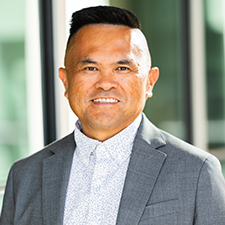
Getting EPIC

Higher ed IT executive shares human-centered insights

Deputy CIO
UC Santa Barbara
Joe Sabado serves as Deputy CIO at UC Santa Barbara. An immigrant and first-generation college graduate with almost 30 years of experience in higher education, he is also a writer, speaker, and mentor whose work focuses on advancing conversations about ethical AI, human-centered systems, and purpose-driven leadership while building communities of belonging and developing the next generation of leaders. We spoke with him about his vision for responsible AI, the role of governance, and how higher education can prepare for a future shaped by both technology and community.
What are the most pressing challenges for colleges and universities today?
Colleges face enrollment declines, rising costs, technology disruption, and shifting demographics. These issues are real, but the deeper challenge is whether institutions can stay true to their purpose while adapting, not reacting, to forces they cannot control. At times, institutions may focus on revenue, make short-term financial choices, or adopt technologies without fully considering whether these decisions strengthen dignity, belonging, and growth. Leaders must also adapt to competing stakeholder interests, which is a constant test. These pressures make it easy for institutions to lose focus, but clarity of mission and values is what sustains them.
The real measure of success is whether students, faculty, and staff are treated as whole people with stories, aspirations, and agency. Without this, higher education risks becoming financially viable but spiritually hollow, especially as its value is questioned due to cost and AI pressures. Success should not be judged only by numbers but by whether people leave more whole, confident, and connected. Higher education must also commit to systemic well-being, creating environments where people feel safe, supported, and able to flourish emotionally, relationally, and professionally.
“The real measure of success is whether students, faculty, and staff are treated as whole people with stories, aspirations, and agency.”
You’ve created influential AI frameworks. How can leaders integrate ethical and trustworthy AI into their campus ecosystems?
The frameworks I created like Campus AI Framework, are emergent blueprints, adaptable, scalable, and designed to include diverse voices in shaping outcomes. They are not prescriptive but hopeful guides for ethical AI adoption. They provide structure in a time when many leaders feel overwhelmed by rapid changes and ethical concerns.
AI adoption in higher education is not just technical, it is moral. Ethical leadership protects dignity and fairness. Effective leadership builds systems and cultures that turn principles into practice. Leaders should always ask: Does this system treat people as more than data points? Who benefits, who is left out, and how will this affect future well-being? Grounded in purpose, AI can be a tool for flourishing rather than harm.
“AI adoption in higher education is not just technical, it is moral. Ethical leadership protects dignity and fairness.”
How do you think higher ed can balance digital transformation with preserving meaningful, human-centered relationships?
Education is relational. Students thrive because of faculty, mentors, peers, and staff who care. Faculty and staff also need to feel valued. Technology should serve these relationships, not replace them. When technology takes the lead instead of people, trust and connection suffer.
“Education is relational. Students thrive because of faculty, mentors, peers, and staff who care.”
The balance comes from asking: does this tool humanize or dehumanize? If AI saves time, reinvest it in teaching, advising, and mentorship. If it scales access, ensure it does not erase presence. The test of digital transformation is whether it sustains connection, belonging, and dignity. Institutions that succeed will be those that integrate AI while keeping people at the center of design and implementation.
What inspired you to create EPIC (Exemplar of a Purpose-Driven, Inspired, and Compassionate Being) and how has it shaped the way you lead?
EPIC came from my story as an immigrant and first-generation student often told I was not enough. I learned leadership is not about titles but about living with purpose, inspiring through authenticity, and leading with compassion. I share openly how being bullied for my accent created fear of speaking, and how reclaiming my history and identity helped me overcome it. My goal is to be a “possibility model,” not a savior, showing that others can rise above hardship too.
EPIC reminds me to lead with purpose, inspire with authenticity, and act with compassion. It keeps me grounded in honoring the humanity of others while staying true to my values.
How can EPIC help navigate academic, professional, and challenges of a tech-driven world?
Students, faculty, and staff face heavy pressures: costs, workloads, uncertainty, and digital overload. EPIC offers a compass: live with purpose, provide inspiration, and act with compassion. Success is not just outputs but alignment with deeper values and relationships.
For students, EPIC is a call to see themselves as more than GPA or résumé. For faculty, it means modeling integrity and care in teaching and scholarship. For staff, it validates growth, agency, and belonging. In a tech-driven world, EPIC reminds us that humanity, not efficiency, must lead. It reflects empathy, moral judgment, creativity, and relationships that AI cannot replicate. These qualities give education its true value, shaping not just careers but whole lives.
What advice would you give higher ed leaders today?
Start with clarity of mission for both your institution and your own life. Commit to inclusive processes where diverse voices shape decisions. Connect every technology choice back to education’s purpose: human development, dignity, and service. Practice foresight, considering long-term impacts. Lead with compassion, because trust is built on care, humility, and consistency. Leadership in this era requires courage to pause, listen, and put people first.
“The best leadership is lived, grounded in purpose, guided by compassion, and measured by whether it leaves people and institutions more whole.”
Ethical leadership protects fairness, dignity, and rights. Effective leadership builds systems that make principles real. Leaders themselves are always becoming. Think globally, act locally, and lead from within. The best leadership is lived, grounded in purpose, guided by compassion, and measured by whether it leaves people and institutions more whole.
*The views and opinions expressed are those of the individual and do not necessarily reflect the official policy or position of their institution.


